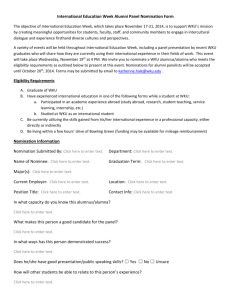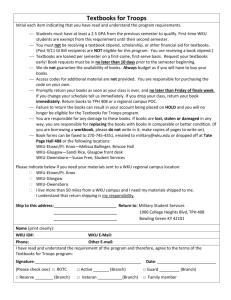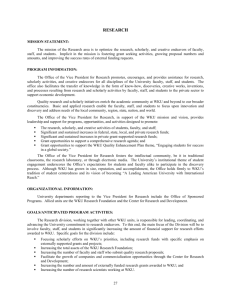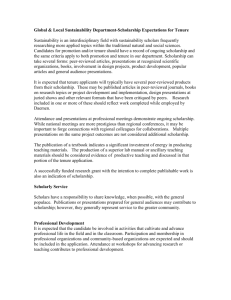WKU Biology Department Promotion and Tenure Dossier Template
advertisement
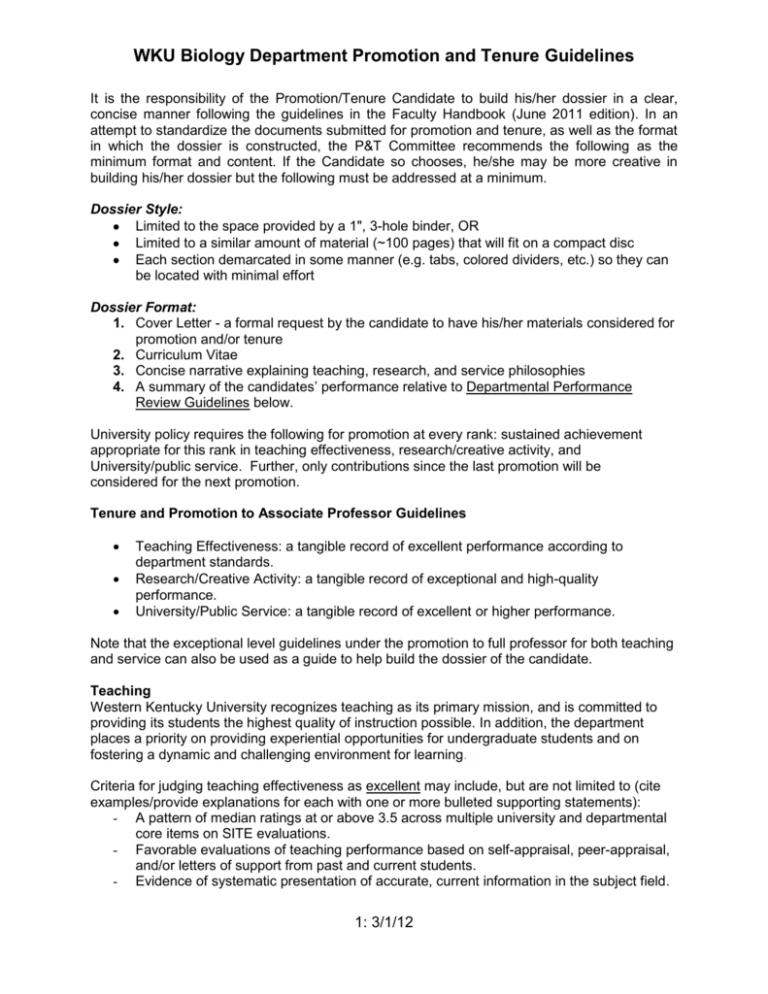
WKU Biology Department Promotion and Tenure Guidelines It is the responsibility of the Promotion/Tenure Candidate to build his/her dossier in a clear, concise manner following the guidelines in the Faculty Handbook (June 2011 edition). In an attempt to standardize the documents submitted for promotion and tenure, as well as the format in which the dossier is constructed, the P&T Committee recommends the following as the minimum format and content. If the Candidate so chooses, he/she may be more creative in building his/her dossier but the following must be addressed at a minimum. Dossier Style: Limited to the space provided by a 1", 3-hole binder, OR Limited to a similar amount of material (~100 pages) that will fit on a compact disc Each section demarcated in some manner (e.g. tabs, colored dividers, etc.) so they can be located with minimal effort Dossier Format: 1. Cover Letter - a formal request by the candidate to have his/her materials considered for promotion and/or tenure 2. Curriculum Vitae 3. Concise narrative explaining teaching, research, and service philosophies 4. A summary of the candidates’ performance relative to Departmental Performance Review Guidelines below. University policy requires the following for promotion at every rank: sustained achievement appropriate for this rank in teaching effectiveness, research/creative activity, and University/public service. Further, only contributions since the last promotion will be considered for the next promotion. Tenure and Promotion to Associate Professor Guidelines Teaching Effectiveness: a tangible record of excellent performance according to department standards. Research/Creative Activity: a tangible record of exceptional and high-quality performance. University/Public Service: a tangible record of excellent or higher performance. Note that the exceptional level guidelines under the promotion to full professor for both teaching and service can also be used as a guide to help build the dossier of the candidate. Teaching Western Kentucky University recognizes teaching as its primary mission, and is committed to providing its students the highest quality of instruction possible. In addition, the department places a priority on providing experiential opportunities for undergraduate students and on fostering a dynamic and challenging environment for learning. Criteria for judging teaching effectiveness as excellent may include, but are not limited to (cite examples/provide explanations for each with one or more bulleted supporting statements): - A pattern of median ratings at or above 3.5 across multiple university and departmental core items on SITE evaluations. - Favorable evaluations of teaching performance based on self-appraisal, peer-appraisal, and/or letters of support from past and current students. - Evidence of systematic presentation of accurate, current information in the subject field. 1: 3/1/12 WKU Biology Department Promotion and Tenure Guidelines - - Regular availability for student consultation. Demonstrable efforts to challenge and develop the scientific, writing, and critical thinking skills of students. Maintenance of current course syllabi and lecture/laboratory schedules on the Internet. Maintenance of good teaching habits, including beginning class on-time, returning examinations in a timely manner, maintaining clear and consistent grading policies, and treating students in a fair, impartial and respectful manner. Willingness to engage undergraduate students in meaningful independent research experiences. Involvement in academic advising of students. Teaching awards won. Unsatisfactory teaching activity may include, but is not limited to (cite examples/provide explanations for each with one or more bulleted supporting statements): - A pattern of median ratings below 3.0 across multiple university and departmental core items on SITE evaluations or the future equivalent. - Failure to maintain current course syllabi and lecture/laboratory schedules on the Internet. - Failure to maintain good teaching habits as defined above. - Unwillingness or inability to engage undergraduate or graduate students in meaningful independent research experiences. - Unwillingness to assist in academic advising of students when asked. Teaching Effectiveness: (Summary of your years of accomplishments at WKU) Lecture courses (arrange in summary table: Year and semester, title of course, course #, new or old teaching prep, in-class or web course, student #; and grade distribution) Lab courses (coordinator for multi-section lab, lab teaching, responsible for lab prep, # TA's supervised) New courses and/or curricula developed Syllabi for the courses taught including lecture schedule SITE evaluation and student’s comments Research mentoring/co-mentoring (undergraduate and graduate): current status of students (e.g. completed/non-completed student, etc.) Student advising (# of students, etc.) Participation in professional development activity centered on teaching Any other contributions in teaching, including grants involving teaching (see “Grant proposals” section under “Research”) Research and Other Scholarly Activity Western Kentucky University is committed to scholarship in its broad sense, and particularly to the involvement of students in the generation of new knowledge and the creative process. The department views research and scholarship as an important contributor to its teaching mission, the professional development of faculty, and the maintenance of academic vitality within the department. Biology is a diverse discipline and we recognize that publications, grant submissions, and other aspects of scholarship vary by sub-discipline in their ease of production and impact on the scientific community. Hence, research productivity will be evaluated in part using criteria that evaluate the depth and breadth of scholarship of the candidate and consider the amount of effort needed for tangible results in his or her particular research field. 2: 3/1/12 WKU Biology Department Promotion and Tenure Guidelines Exceptional or significant, high quality research activity/performance may include, but is not limited to (cite examples/provide explanations for each with one or more bulleted supporting statements): - Sustained publication record of research findings appropriate to the candidate’s field in peer-reviewed scientific journals, monographs or books. - It is expected that a minimum of one of these within each five year period should be coauthored with either an undergraduate or graduate WKU student who were researchers in the lab of the candidate. - Articles on the scholarship of teaching. - Sustained attempts or receipt of funding from external sources for research, equipment, and/or professional travel. - Pursuit of intramural funds for research, equipment, and/or professional travel. - Leadership in obtaining funding for large-scale or multiple-investigator projects. - Dissemination of research findings, at the national and international level, either by students or the faculty member. - Dissemination of research findings in non-peer-reviewed outlets (i.e., non-refereed journals/magazines, technical or contract reports, oral or poster presentations, electronic publications, databases. - Publication of novel approaches or findings related to the scholarship of teaching. - Receipt of patents or copyrights. - Development of other forms of intellectual property of demonstrable value. - Involvement in professional development activities centered on research. - Acquisition of new research equipment or capabilities. - Research awards won. - If a sabbatical was awarded based on scholarship, tangible results must be shown. Unsatisfactory research performance may include, but is not limited to (cite examples/provide explanations for each with one or more bulleted supporting statements): - Failure to generate publications based on research efforts. - Unwillingness to seek internal or external funds. - Lack of tangible results or contributions from research efforts and/or sabbatical leave. - Failure to participate in professional development activities related to research or scholarship. Research: (Summary of your years of accomplishments at WKU) Brief description of projects in progress and completed Scholarly Contributions (distinguish WKU from pre-WKU accomplishments) o Publications (peer-reviewed, non-peer-reviewed): journal articles, books, book chapters, other articles, etc. o Presentations (indicate student authors) and categorize as local, regional, state, national/international; indicate any award or honor received o Invited presentations, seminars, etc. o Grant proposals (PI/co-PI/senior contributor/collaborator) external or internal, research/teaching or training-oriented: submitted, pending, declined or awarded, dollar amounts and agency name, start & end date, etc. o Research supervision (e.g. undergraduate research, Honors theses, graduate thesis or dissertation, post-doc/visiting scientist) o Patent and invention disclosures or copyrights o Participation in professional development activity centered on research 3: 3/1/12 WKU Biology Department Promotion and Tenure Guidelines University/Public/Professional Service Western Kentucky University views a record of service as evidence of the candidate’s commitment to furthering the missions of the department, college and university. Moreover, service to the department, college, university, and community at large is recognized as an essential component of good academic citizenship. Criteria for judging service performance as excellent may include, but are not limited to (cite examples/provide explanations for each with one or more bulleted supporting statements): - Conscientious service on departmental, college and university committees. - Service activity on behalf of POD centers. - Availability for consultation and intellectual discourse with peers. - Regular attendance at faculty meetings and departmental seminars. - Sustained efforts directed at recruitment of new students to the department. - Work with K-12 schools, community groups, and the public on behalf of the department. - Participation in programs/activities that enhance the reputation of the department, college, and university. - Referee/reviewer of manuscripts or grant proposals. - Service to local, state and national governmental agencies and commissions. - Involvement in professional development activities centered on service. - Involvement with Freshman Seminar or other university retention initiatives. - Efforts at recruiting new students on behalf of the university. - Contribution to the mission of trans-departmental units (e.g., International Programs, University Honors Program, Women's Studies, African-American Studies, Center for Gifted Studies, Center for Teaching and Learning). - Efforts associated with initiatives to increase diversity on campus. - Regular attendance at Commencement. - Involvement in professional development activities centered on university initiatives. - Service awards won. Unsatisfactory service performance may include, but is not limited to (cite examples/provide explanations for each with one or more bulleted supporting statements): - Failure to regularly attend faculty meetings and departmental seminars. - Unwillingness or inability to serve productively on departmental, college and university committees. - General unavailability to students and colleagues, i.e. poor academic citizenship. - Unwillingness to participate in or support university initiatives. University/Public/Professional Service: (Summary of your years of accomplishments at WKU) WKU (state your roles, activities, and any significant achievements) o Department-level o Program of Distinction (ARTP center) level o College-level o University-level Regional or state level National or international level Service with K-12 schools, and Community/Technical College Professional service o Reviewer of manuscripts, book chapters, etc. o Reviewer for grant proposals (agency name, panel or ad hoc reviewer, etc.) 4: 3/1/12 WKU Biology Department Promotion and Tenure Guidelines o Leadership positions/memberships in professional associations o Service to editorial boards Participation in professional development activity involving service Advising to on-campus student organizations Any other contributions in service, including grants involving service (see “Grant proposals” section under “Research”) Promotion to Full Professor Guidelines Teaching Effectiveness: a tangible record of exceptional and high-quality performance. Research/Creative Activity: a tangible record of exceptional and high-quality performance. University/Public Service: a tangible record of exceptional and high-quality performance. The Biology Department values excellence in teaching, research and service, and an exceptional level of performance in all three categories is expected. However, an emphasis in one area that offers the flexibility for faculty to best express their talents in service to the department is possible. Therefore in the year following the promotion to associate professor, a faculty member, with the approval of the department head and the tenure and promotion committee, may choose to emphasize one of teaching, research, or service, rather than a more traditional balance between these three areas. The department will assess the faculty performance of the candidate based on this allocation of effort. All guidelines for promotion to Associate Professor apply to promotion to full professor, in addition to the following. Teaching Exceptional or significant, high quality teaching activity/performance may include, but is not limited to (cite examples/provide explanations for each with one or more bulleted supporting statements): - A pattern of median ratings at or above 4.0 across multiple university and departmental core items on SITE evaluations or the future equivalent. - Development of a new course or laboratory and/or new laboratory procedure(s) for an existing course. - Significant effort directed at developing the scientific, writing, and critical thinking skills of students, without a reduction in other responsibilities. - New teaching preparations without reduction in other responsibilities. - Service as coordinator of a multiple-section course. - Demonstrable and sustained effort to improve quality and/or quantity of course materials available over the Internet. - Incorporation of field trips or other experiences beyond the normal scope of the course. - Involvement in distance learning (teaching at satellite campuses or via ITV). - Chairing or extensive service on graduate or undergraduate honors thesis committees. - Involvement in training a large number of undergraduate research students without a reduction in other responsibilities. - Acquisition of new equipment, facilities, etc. for instructional purposes. - Submission of grant proposals to external agencies for acquisition of equipment, facilities, and/or supplies for instructional purposes. - Shouldering a large academic advising role without reduction in other responsibilities. 5: 3/1/12 WKU Biology Department Promotion and Tenure Guidelines - Demonstrable effort to improve teaching effectiveness through professional development. Research and Other Scholarly Activity See the Guidelines for promotion to Associate Professor. University/Public/Professional Service Exceptional or significant, high quality service activity/performance may include, but is not limited to (cite examples/provide explanations for each with one or more bulleted supporting statements): - Shouldering a large, pivotal service or administrative role without reduction in other responsibilities (e.g. service on ad hoc and/or search committees, chairing committees, directing POD center, departmental class scheduling, significant effort directed at recruitment, retention, or increasing diversity on behalf of the university, teaching or administrative service on behalf of trans-departmental units). - Advisement of student organizations. - Scholarly development and professional support of students. - Performance of service to the larger scientific community through leadership in scientific societies, service on editorial boards and grant review panels. - Involvement in obtaining capital gifts to the department, college, or university. 6: 3/1/12

